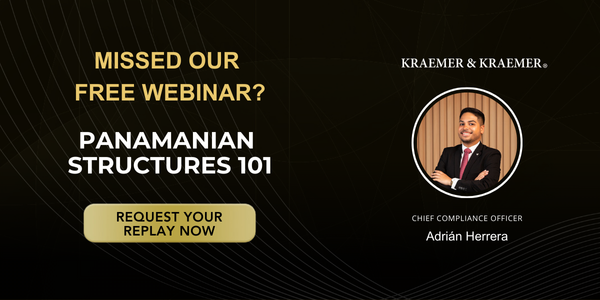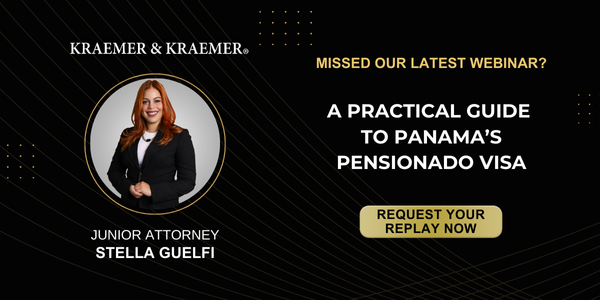FAQ
Frequently Asked Questions
Choose the subject and question of your interest
A: Yes, opening a bank account can take from 5 to 10 business days, and most banks require:
- Passport and a second ID
- Two bank reference letters
- Last three months of bank statements
- Proof of income (employment letter, income tax returns)
- Last two years of tax returns
A: Yes, there are. If you are interested in opening a brokerage account in Panama, the paperwork requirements are similar to those for opening a bank account. In addition, it’s required for you to have a proven address in Panama.
A: Yes, you can open a remote bank account in Panama. There is a limited number of banks that will allow this, but it is possible.
A: Yes, we can assist you with opening corporate bank accounts in Panama. We work with various banks; be sure to reach out to receive the full list of banks we work with.
A: Some banks banks that we work with have that product available; however, we recommend Paguelo Facil. Please note that, in general, agencies that provide such service may have reservations on the type of business, product, or service you provide. For that reason, they may impose restrictions.
A: Kindly reach out to us, and we will inform you of the reputable banks we work with.
A: The main requirements are divided into two categories: corporate documents and personal documentation. Keep in mind that the banks will conduct due diligence on people related to the corporation.
A: No, this is not considered proof of income. A few examples of valid proof of income include last year’s tax returns, a work letter, or a pension letter.
A: No, all the banks that we work with can open accounts for people who do not have Panamanian residency or live in Panama.
A: No, the only documentation that must be original is bank forms.
A: No, the account approval/denial is at the bank’s discretion.
A: Yes, you can, as long as you are an administrator of the company. You can invest and open a business, but to work on it, you are supposed to have a working permit, even if it is your own business.
A: A Corporation is advised if you were going into business, either in Panama or even in any other country in the world, so that you can separate the possible business liability, if any, from your personal assets. Some people also use Corporations as a Holding of Real Estate or Bank Accounts.
A: Corporations are conformed by the Dignataries (President, Secretary and Treasurer); Board of Directors (at least three) and the Shareholders. The Shareholders are the ones that have the control of the Corporation, and can name and assign the Board Members, who then assign the CEO or President, and other officers, which are responsible for the administrative management of the company’s functions.
A: The annual fee of an entity is $300 of Single Rate Tax.
A: Yes. You can accomplish this with a minute entry in the company’s minute book or with an entry in the articles of incorporation.
A: Panamanian Law requires the corporations to necessarily have a resident agent, who must be an authorized attorney or law firm.
A: Yes, but a company’s minute must be drafted and recorded at the Public Registry.
A: The process to close a corporation requires a minute entry in the company’s minute book, approving its closure. This minute must be notarized, registered in Panama’s public registry, and published in a local newspaper at least once.
A: Private Interest Foundations (PIF) pays US$400.00 of annual tax, as a government fee for its right of existence. Additionally the resident agent might charge his own fee to represent the corporation.
A: Private Interest Foundations (PIF) are the best choice for Estate Planning, so that, in case that you have different assets, such as real estate and bank accounts, they can be hold by your PIF, so that your declared heirs can inherit them automatically, without going through an expensive and long Probate Process.
A: IBCs and LLCs share some similarities. Both are legal entities and they limit a member’s responsibility to his participation as a shareholder or partner. However, the IBC requires at least 3 directors and 1 or more shareholders who don’t have to be publically disclosed – for this reason, IBCs are also known as Anonymous Corporations. On the other hand, the LLC requires a minimum of 2 Managers and 2 or more Partners. Their names must be publicly disclosed in all registration documents, providing more transparency.
A: An IBC incorporation takes approximately 7 business days.
A: The minimum capital must be $10,000.
A: There is an annual government fee that must be paid to maintain your entity in good standing. However, the taxes over the income earned are approximately 25% if you have an ongoing operation.
A: A corporation can be formed by only one shareholder.
A: Shareholders do not necessarily have to be Panamanian, they can be natural or legal persons of any nationality and domiciled anywhere in the world.
A: Shareholders must comply with any applicable legal and regulatory requirements. Their liability is limited to the amount they owe on their shares and does not extend beyond their investment, except in exceptional circumstances.
A: The Public Registry is the institution of the state where corporations incorporated under Panamanian law are registered or recorded, as well as those foreign corporations that carry out activities in Panama. It is worth mentioning that the Public Registry of Panama is considered to be one of the most orderly, efficient and modern in all of Latin America.
A: Activities related to money laundering, drug trafficking, human trafficking, terrorism, are considered illegal activities both in Panama and anywhere else in the world
A: Patrimonial and medical law is a specialized area of law that deals with the legal issues facing seniors and their families. These issues may include estate planning, long-term care, and guardianship.
A: There are many benefits to working with a patrimonial and medical law attorney, including:
- The attorney can help you understand your legal options and make informed decisions about your future.
- The attorney can help you prepare the necessary legal documents, such as a will, medical proxy, and living will.
- The attorney can help you navigate the complex legal system and protect your rights.
A: Some of the common legal issues faced by expats include the lack of estate planning, guardianship, long-term care planning, medical planning, and more.
A: An estate planning package is a set of legal documents that help you manage your assets and ensure that your wishes are carried out after your death. It may include a will, medical proxy, health care proxy, living will, and other documents.
A: Estate planning is especially important for elders in Panama because they may have accumulated significant assets and may need to make arrangements for their care in the event of incapacity. A well-drafted estate plan can help ensure that your assets are distributed according to your wishes and that your loved ones are taken care of.
There are three types of estate planning packages in Panama: basic, plus, and full.
- – The Basic Package includes the most essential documents, such as a will, medical wishes & proxy, and a letter of interest and wishes.
- – The Plus Package includes all the documents of the Basic Package, plus 1 hour of consultation and legal opinion.
- – The Full Package includes all the documents in the Plus Package plus additional documents, such as 2 hours of consultation, escrow (minimum 1,500.00 USD), and additional services as needed.
A: Probate is the legal process of administering the estate of a deceased person. This includes identifying the heirs, determining the value of the assets, paying the debts, and distributing the assets to the heirs.
A: The probate process can be initiated by any interested party. For example, the spouse, children, or heirs of the deceased person can initiate probate.
A: The Panamanian Civil Code also identifies two types of probate proceedings. The testate process takes place when the deceased has recorded a will that meets all legal requirements. The intestate process takes place when the deceased has no recorded will to distribute his or her estate, or when there is a will, but it does not meet the legal requirements.
A: Depending on the complexity of the estate, the probate process can take anywhere from a few months to a few years.
A: Succession law is the body of law that governs the distribution of assets after death. It determines who inherits the assets and how those assets are distributed.
A: The rules of intestate succession in Panama are based on the Civil Code of Panama. The rules provide that the assets of the deceased are distributed to the next of kin in the following order:
- Surviving spouse
- Children
- Parents
- Siblings
- Grandchildren
- Other relatives
A: A medical wish, also known as an advance directive, is a written statement expressing your wishes for your medical care in the event that you become incapacitated and unable to make decisions for yourself.
A: Having a medical wish is important because it ensures that your wishes are known and respected if you become incapacitated. This can help avoid conflicts among your loved ones and ensure that you receive the care you want.
A: You can include your wishes about the following:
- – Whether you want to be resuscitated or placed on life support.
- – Whether you want to receive artificial nutrition and hydration.
- – Whether you want to receive pain medication, even if it may shorten your life.
- – Who do you want to make decisions about your care if you become incapacitated.
A: Patrimonial planning is the process of making arrangements for the management and distribution of assets after death. It is also a legal strategy that can be used to protect assets from creditors, lawsuits, and government agencies.
A: There are many benefits to having a patrimonial plan, including: Peace of mind knowing that your assets will be distributed according to your wishes. Protection from creditors, lawsuits, and government agencies. Flexibility to change your plan as your needs change, and reduced taxes.
A: Some of the things that can be included in an estate plan are: A will, a health care proxy, a living will, a trust, asset protection strategies.
A: A will is a legal document that expresses your wishes for the distribution of your assets after your death.
A: The requirements for a valid will in Panama are as follows: The will must be in writing. The will must be signed by the testator (the person making the will). The will must be witnessed by two persons who are not beneficiaries of the will.
A: If you die without a will, your assets will be distributed according to the laws of intestacy. This means that your assets may not be distributed according to your wishes.
A: A medical proxy is a person who is authorized to make medical decisions on your behalf in the event that you are unable to do so.
A: Having a medical proxy ensures that your wishes are known and respected if you become incapacitated. This can help avoid conflicts among your loved ones and ensure that you receive the care you want.
A: You should include your wishes regarding your medical care, such as whether you want to be resuscitated or placed on life support. You should also include the name and contact information of your medical proxy.
A: This program is no longer available.
A: Permanent residency only grants you the right to reside (live) in the country legally. In other words, you can stay in the country for as long as your residency status allows. However, the right to work requires a separate application for a work permit. There are specific residency programs that make you eligible to apply for a work permit. If that is your intention, it is important to consider those types of residency options from the beginning.
A: A Multiple Entry Visa is required for any foreigner with a pending residency application who intends to travel abroad during that period. A temporary resident who leaves the country without this visa will be fined USD $2,000.00. We usually include the Multiple Entry Visa in our clients’ applications by default.
A: The criminal Record is good up to six months, unless the document itself specifically states differently. The health certificate issued in Panama is good for ninety days. The bank reference letter is good for thirty days. Marriage certificates, birth certificates, and retirement letters are valid for 6 months.
A: Usually at least five (5) business days are required, but eight (8) to ten (10) days are recommended:
- One day to get the current passport notarized
- One day to do the registration at Immigration
- One day to apply for the residency, and for the multiple entry visa
- Two more days to be granted the multiple entry visa
A: Upon approval, you can stay in the country for as long as you decide. If you leave, it is important to visit back the country at least once every two years, so that your residency may not be subject to revocation.
A: No, you must request a national criminal background check from your home country or the country you have lived in during the past ten years. What the Panamanian Consulate can do is authenticate the document.
A: Nationals of restricted countries, require to apply for a special visa in order to visit the country, called an Authorized Toursit Visa. Nonetheless, if the applicant has a Visa to the USA or England, and has used it before, he/she can visit the country for up to 30 days without it.
A: Residency is required in order to apply for a local driver’s license. That is a simple process, for which we can give instructions on the process, but we choose not to assist on it, as it is NOT a procedure whereas an attorney is required.
A: Foreigners are allowed to drive with their foreign license for up to 90 days. However, once they apply for residency, they are no longer allowed to drive with it, as they will be required to obtain a Panamanian driver’s license.
A: According to Resolution 15703 from August 24, 2012, you have 6 months.
A: Please review Law 14 from October 15, 2013.
A: Yes. Following Executive Order 229 from March 22, 2013, foreigners with this work permit, with a minimum salary of B/. 850, and with at least 2 previous extensions, can request permanent residency.
A: Resolution 4803 from March 30, 2012; Law 15 from February 1, 1966; Law 3 from February 22, 2008; and Executive Order 320 from August 8, 2008.
A: Any former foreign worker, with more than 5 years in a Multinational Company, can apply for permanent residency, following the requirements from Executive Order 822 from August 2, 2013.
A: No. Certificates (e.g. shares) must be registered under the applicant’s name according to Executive Order 147 from March 17, 2017.
A: Any national or foreign person or entity can purchase and own property in the country.
A: It depends on how you want to hold the property. If you opt to hold it in your name, then you need to sign a Power of Attorney and authenticate it in the nearest Panamanian Consulate. Although, if you would like to own it in a Holding Corporation or Foundation, then we can prepare and sign the papers on behalf of your new entity, for which we would just need to coordinate it all.
A: Not as you know it. In Panama there is Title Search or due diligence, which is advised to be done by an experienced attorney. Title insurance is not generally offered by Insurance Companies in Panama.
A: Depending on the type of land you are buying, we would recommend you to survey it to make sure the measures and boundaries are as offered.
A: Option of purchases of real estate are valid in Panama, and can be done through a contract, which is better enforced if registered at the Public Registry, for which an attorney is required.
A: Of course, as long as the buyer is agreeable with it. In that case, a shares sale contract is drafted, and the Corporation’s Dignataries and Board of Directors shall be replaced.
A: No, as only regulated Panamanian trusts are allowed. Although, it is possible to have a foreign entity that is controlled by a foreign trust, to hold property in Panama.
A: Although we do have co-ownership of property, there is no option of survivorship rights.
A: According to the Law, if the shares have been duly issued and fully paid for by its owner, at the time of transferring them, a 5% capital gain tax withhold must be done, and paid to the government.
A: Real Estate Sale taxes are two: Sale Transfer Tax, which is 2%; and Sale Capital Gain Tax, which is a 3%. Both taxes are paid by the seller, prior to the conclusion of the sale, and are paid based on the highest value between the Selling Price or the Property Registered Value.
A: You can request a tax statement for either your property or corporation, at the Tax Office, by going in person, or by applying online for a NIT access.
A: The RUC is the “tax id” for persons, entities or properties, and is used as the “username” for online acces to the related account with the Tax Office; and the NIT is the quivalent to the “password”
A: Goods and Services in Panama are taxed at a 7% rate, called ITBMS, and it is applicable by all companies that have gross sales over US$3,000.00 per month or US$36,000.00 a year.
A: Hotels and Hostals pay ITBMS at a 10% rate by default, regardless of its income amount.
A: According to Tax Authority’s Resolution 201-831 of March 23rd, 2007, all improvements must be declared within six months from the date of the Occupation Permit, otherwise some penalties will be applied.
A: According to Tax Authority’s Resolution 201-831 of March 23rd, 2007, all improvements must be declared within six months from the date of the Occupation Permit, otherwise some penalties will be applied.
A: Yes. According to Tax Authority’s Resolution 201-4603 of Dec.28th, 2001, all corporations are obligated to have its RUC registered.
A: Property taxes’ statues limitations are 10 years.
A: ncome taxes’ statues limitations are 7 years, starting the last day of the year when they were due.
A: We are allowed up to 36 months after the due date for filing income tax, in order to file for its rectification, as long as the tax payer is not being subject of an auditing.
Still have questions?
If you hace any concerns, want to start a process or would like to connect, feel free to send us a message through the contact form or at info@kraemerlaw.com











